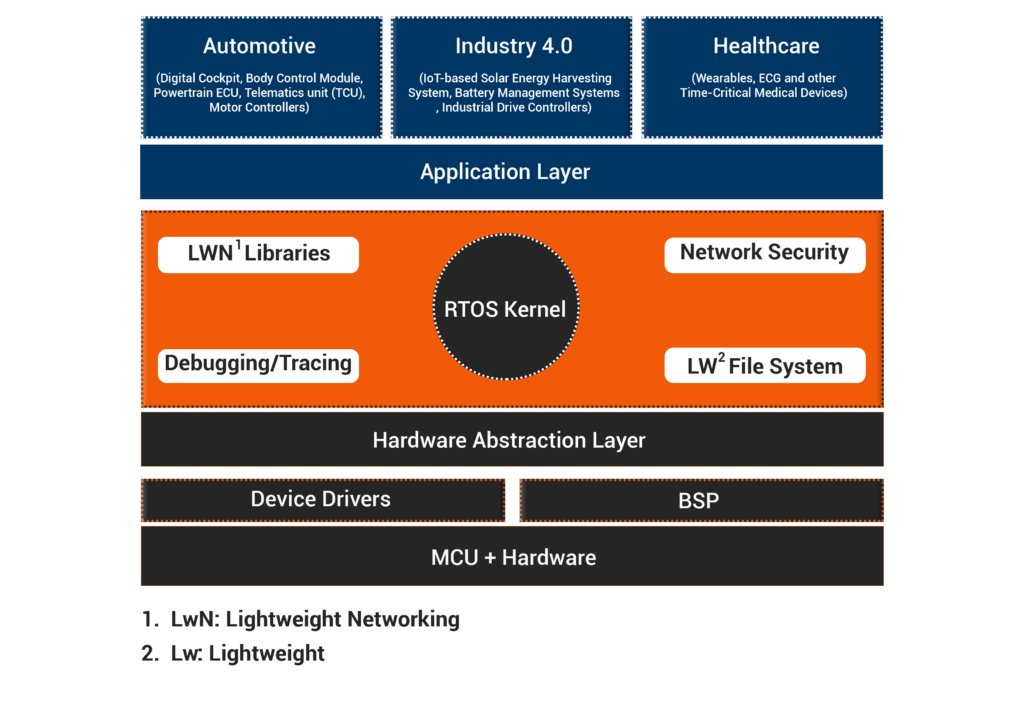RTOS Programming & Kernel Porting Services for Automotive and Industry 4.0
We have partnered with global OEMs from the Automotive and Industrial Automation space and successfully delivered Embedded RTOS programming and porting related projects. A snapshot of our experience in kernel porting and application development for Embedded Real Time Operating System (RTOS):
- Automotive applications like Body Control Module (BCM), Powertrain ECU, Motor Controllers, HVAC and other Electronic Control Units (ECU)
- Industry 4.0 applications like IoT-based Solar Energy Harvesting platforms, Battery Management Systems, Industrial Drive Controllers and more.
Our teams have in-depth expertise in a wide range of hardware platforms and architectures like LPC series from NXP semiconductors, STM32F4 series from ST Microelectronics – to name a few.

Hardware & Software Consulting Services
- Evaluation and selection of the Microcontroller (MCU) platform
- Analysis of RTOS features required for your embedded system
- Evaluation and selection of RTOS best suited for your embedded system

RTOS Kernel Porting to the Target Platform
- Setting up the interrupt subsystem
- Setting up the Timer subsystem
- Configuring and adding the required lightweight library components supported by RTOS

RTOS Kernel Configuration
- Testing the compatibility of RTOS Kernel port with the selected MCU
- Configuring the Kernel based on the target MCU framework/specifications
Device Driver Development
- Development of Device drivers for the peripherals supported by the MCU platform
- Support for Flash Bootloader software development and BSP (Board Support Package) customization
- Integration of the BSP layer as per the RTOS specifications
MSupport for Application Development
- Application design
- Source Code Development
- Source Code Compilation
- Downloading of the executable files to the target/MCU board
- Execution of the application program on the target platform
- Tools: MCU IDE (this includes component editor, compiler, linker, and debugger).
Validation & Debugging of the Complete Application
- Support for debugging and validation along with performance optimization of the complete application
- Support for functional testing, performance testing and sanity testing of each module
Architecture Diagram of Embedded RTOS

RTOS Programming & Kernel Porting – Customer Success Stories
The following customer success-stories are testimonials of our expertise in Embedded RTOS porting:
Business Value-Adds of RTOS:
- RTOS is suitable time-critical applications. RTOS makes it possible to allocate processor resources to high priority tasks without delay. Hence an RTOS ensures that your application can respond to an urgent event immediately.
- RTOS enables your system to efficiently manage and synchronize multiple processes, with the help of schedulers.
- It often has a low memory footprint and is ideal for microcontroller platforms.
Meet Our IoT Leaders

Emmanuel P John
Solution Architect, IoT
Emmanuel is our superstar IoT Solution Architect! With experience spanning 20 years in Embedded Systems Engineering, he is a vital part of our IoT BU.
His ability to translate the customer’s product vision into a cutting-edge solution is commendable. A great team player, Emmanuel has been at the helm of some of our most challenging projects till date.

Suhas Tanawade
Senior Delivery and Account Manager, IoT (Mr.Perfectionist)
Suhas is an industry veteran with more than 25 years of experience in the domain of Embedded Engineering and Software Development.
His exemplary leadership skills have ensured that several challenging RTOS programming projects were successfully delivered on time.
FAQs on Android/Linux Porting Services
- mapping that function to a particular task and
- initialising that task using an Embedded RTOS API.
- Library of software stacks for System Security
- System Networking and communication related software stacks (including lightweight TCP/IP stack)
- IoT libraries (includes support for MQTT, CoAP)
- Over-The-Air (OTA) Update & GUI Library
| PROPRIETARY EMBEDDED RTOS | OPEN SOURCE EMBEDDED RTOS |
|---|---|
| Are pre-certified for most important industry standards, including the International
Electrotechnical Commission (IEC), International Organization for Standardization (ISO). Critical to be considered especially if your project involves development of safety-critical applications such as Advanced Driver Assistance Systems (ADAS). |
Your development team may not get additional support for system security enhancements, product certifications and functional safety (ISO 26262) compliance. |
| If any issue or problem occurs during Embedded RTOS based application development, you can immediately call for professional support services from the vendor. | Finding on-time and professional engineering support for fixing an anticipated failure or bug is a challenge. |
| There will be restrictions and costs associated with re-use of RTOS kernel components – it will be strictly as per the terms and conditions specified the RTOS vendor. | Involves limited restrictions on reuse of the RTOS kernel components and code base. |
| Supports a wide rage of functionalities required by modern day Embedded application such as low-memory footprint, in-built security, support for network stacks etc. | Most open -source embedded RTOS usually extend support for a wide range of the functionalities supported by proprietary RTOS as well |
- Support for In-built security features like TLS, embedded hardware security, software encryption
- Support for critical software stacks for network connectivity and communication
| EMBEDDED RTOS | LINUX /ANDROID OS |
|---|---|
| Suitable for low-power microcontrollers (MCU) with low-memory footprint Can run on 8bit to 10Kb MCU |
Suitable for power and memory-intensive, high performance Processors Requires 4Mb of ROM and 16MB of RAM even for booting |
| Designed to achieve real-time performance | Designed as a general-purpose operating system. |
| Follows a predictable / deterministic execution pattern and hence is ideal for applications with real-time requirements | Involves limited restrictions on reuse of the RTOS kernel components and code base.Not optimized to follow a deterministic pattern for handling interrupts |
- Experience in Firmware and Device Driver Development
- Testing and validation expertise
- Know-how and hands-on experience on memory allocation techniques (heap and stack)
Ans. An embedded RTOS, is inherently designed to leave a low-memory footprint . On average, an embedded RTOS uses upto 2Kb(Flash Memory) and 1Kb-4Kb (RAM). In effect, RTOS kernel porting might take up just about ~5% to10% of your MCU platform. Hence, there is no need for adding any extra memory to the MCU for RTOS kernel porting.




